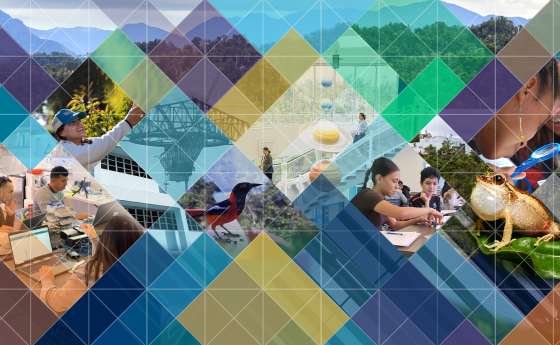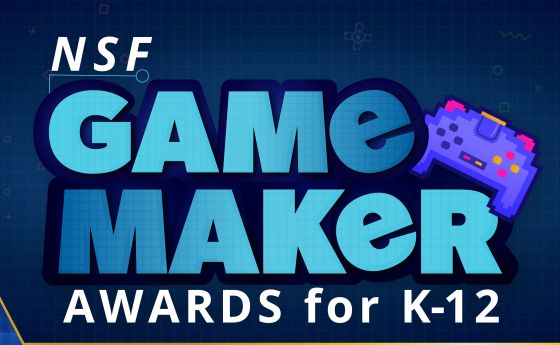
NSF 101: High school students, undergraduate and post-baccalaureate scholar funding opportunities
The U.S. National Science Foundation supports multiple programs for high school, undergraduate and post-baccalaureate students to help fund research opportunities.
There are several ways to find these programs, including the funding search on NSF's website and the NSF Education & Training Application, or ETAP.
To help you begin your search, listed below are opportunities available for high school, undergraduate and post-baccalaureate students. Many of these opportunities require a principal investigator, or PI (a researcher who oversees a lab), to submit the grant proposal on behalf of the student. These include opportunities for supplemental awards, which require a PI to already have an active grant. Programs where students can submit proposals directly are noted by an asterisk (*); others require both a PI and their institution to apply.
If students need help finding a PI, they can search for researchers with NSF grants using the Awards Advanced Search. By checking the active awards box and typing in a university or research institution in the "Organization" box on the top right, or by selecting a state in the box underneath, students should be able to find PIs with active grants in their area. Students should then email the PIs to ask about research opportunities and if the investigator would be willing to submit the supplement request or grant.
High school students
- High School Student Research Assistantships (MPS-High)
This supplemental grant aims to foster interest in mathematics and physical sciences for high school students. This grant is generally under $6,000 per student and should be submitted by a PI.
- Research Assistantship for High School Students (RAHSS)
RAHSS is a supplement for PIs with an active grant from the Directorate for Biological Sciences and aims to foster interest in pursuing biological sciences. This grant is generally less than $6,000 per student.
Undergraduate students
- Research Experience for Undergraduates (REU) and Supplemental Awards*
REU awards are designed for U.S. citizens, nationals or permanent residents who are undergraduates in any area funded by NSF. There are two ways to access this funding: 1) PIs may include REU awards[V(3] as a supplemental for a new or renewal grant, or 2) students may apply to REU Sites at different research institutions. While NSF funds REU Sites, students apply via the sites, not NSF. Different sites may have different requirements, so be sure to check the requirements if interested. NSF has sites separated by topic.
- Astronomical Sciences
- Atmospheric and Geospace Sciences
- Biological Sciences
- Chemistry
- Computer and Information Science and Engineering
- Cyberinfrastructure
- Department of Defense
- Earth Sciences
- Engineering
- Ethics and Values Studies
- International Science and Engineering
- Materials Research
- Mathematical Sciences
- Ocean Sciences
- Physics
- Polar Programs
- SBIR
- Social, Behavioral, and Economic Sciences
- STEM Education
- Robert Noyce Teacher Scholarship Program*
This program provides scholarships, stipends and programmatic support to science, technology, engineering and mathematics majors or professionals who want to become K-12 teachers. Colleges, universities and other institutions (which can be found using the program's Project Locator) determine the recipients, not NSF. There are also frequently asked questions, including what is considered a STEM major by the Noyce Program. There are three tracks:
Track 1: Scholarships and Stipends
This track provides a scholarship of $10,000 to full tuition for STEM majors and STEM professionals. For each year a person is on the scholarship, they are required to teach in high-need local school districts for two years within eight years of finishing their bachelor's degree.
Track 2: Teaching Fellowships
This track is for STEM professionals who want a master's degree with a teacher certification or licensure. Recipients receive $10,000 to full tuition for the final year of their degree if they are attending school full time or two years if part time. They must be a full-time teacher for four years in a high-need local school district within six years of graduating and take on a leadership role within the school or district. During these four years, they must receive an annual supplement of $10,000 per year.
Track 3: Master Teaching Fellowships
This track is for K-12 STEM teachers who already have their teaching certificate or licensure, possess a bachelor's or master's degree and participate in a program for developing teacher leaders. These recipients must serve as a full-time teacher in a high-need local school district for five years within seven years of starting in the program. For elementary school teachers, they should teach math and/or science for at least 50% of their classroom teaching responsibilities. Recipients are also required to take on leadership roles in the school or district. They receive a $10,000 per year supplement while participating.
If recipients do not have a master's degree in education or STEM, they must enroll and complete the degree within the first year. They will receive funding for one year of completing their master's.
Post-baccalaureate
- Computer and Information Science and Engineering Graduate Fellowships (CSGrad4US)
The fellowship is for people who have a bachelor’s degree in computer science and working in industry but want to pursue a doctoral degree in computer science. The fellowship provides in-depth mentoring for post-baccalaureates who are considering a transition from industry jobs to a doctoral program by helping them identify and applying graduate programs and finding a research mentor. It also provides for a year of post-baccalaureate mentoring and the application process for graduate school, and a $34,000 stipend for 3 out of the 5 years the fellow is earning their degree. In addition, another NSF 101 provides more information. - Geoscience Research Experiences for Post-Baccalaureate Students (GEO-REPS) Supplemental Funding Opportunity
This supplemental funding is for post-baccalaureate scholars who would like to engage in research opportunities but are not enrolled in graduate school. Only PIs with active funding from the Directorate for Geosciences may request a supplement to an existing award and must receive approval from their program officer to submit a request. In the request, mentors must identify the post-baccalaureate participant and potential research project. Priority is given to individuals from historically excluded or underrepresented groups in geoscience research and those who did not have access to opportunities to begin or complete a research experience as an undergraduate due to pandemic-related interruptions. The funding is for up to 12 months and post-baccalaureate recipients are expected to research full-time with a minimum stipend of $650 per week.
- Research and Mentoring for Post-Baccalaureates in Biological Sciences (RaMP)
This program supports networks of researchers who in turn provide full-time research, mentoring and training opportunities for recent college graduates who had no or minimal research experience during their undergraduate education. PIs who research biological topics and their institutions would apply for this grant. Post-baccalaureate participants are supported by a stipend of at least $32,500 per year for three years. More information is available on ETAP.
- Post-Baccalaureate Research Experiences for LSAMP Students (PRELS) Supplemental Funding Opportunity
This opportunity is for post-baccalaureate students who were members of the Louis Stokes Alliances for Minority Participation Program. These students must have:
- been in good standing in LSAMP as undergraduates.
- earned their bachelor's degree in STEM no more than 24 months prior to being selected for the program.
- not currently enrolled in any degree program.
- intend to apply to a STEM graduate program or career after this program.
This award can last up to 12 months with a stipend of $25,000. Institutions that apply for this grant on behalf of PIs must be a lead institution for a LSAMP program. In addition, up to $5,000 — including materials, supplies and travel — per PRELS research scholar may be requested. Up to $5,000 may be requested in support of each faculty member.
Multiple Education Levels
- Advanced Technological Education (ATE)
This grant for students at two-year colleges and high schools supports the education of technicians in high-technology fields. ATE has multiple tracks that are supported through education-industry partnerships, and has worked with other programs, such as the National Institute of Standards Manufacturing Extension Partnerships, Manufacturing USA Institutes and NSF Industry-University Cooperative Research Centers program. The application for this program should be submitted by a PI and their associated organization.
- Directorate of Geosciences- Veterans Education and Training Supplement (GEO-VETS) Opportunities
This opportunity is specifically for U.S. veterans with an interest in geosciences (i.e., atmospheric and geospace, earth, ocean and polar sciences) to work with researchers currently funded by the Directorate for Geosciences. Veterans should be one of the following:
- Full- or part-time STEM undergraduate student at a two- or four-year university.
- Full- or part-time STEM graduate student.
- K-12 STEM teacher.
- STEM faculty at a two-year university.
The researcher the veteran wishes to work with, not the veteran, should submit the supplemental request.
- Summer Scholars Internship Program*
This program allows for undergraduate and graduate students to work as an intern for NSF for 10-weeks during the summer to understand science administration and the impacts of federal policies on science and engineering. Those interested in this program should apply through the Hispanic Association of Colleges and Universities National Internship Program or Quality Education for Minorities Network Talent Development and Innovation in Science Summer Internships[FD(5] .
This extensive list shows the ways NSF helps to train the next generation of STEM researchers and teachers with hands-on learning. If you are interested in learning more about any of these programs, reach out to the contacts listed on the award webpages.
Keep a look out for part two of this series, which will focus on graduate and post-doctoral scholar funding opportunities!
There are several ways to find these programs, including the funding search on NSF's website and the NSF Education & Training Application, or ETAP.



